Soggy Facility Thwarts Long-Delayed Plan to Reduce Heavy-Duty Diesel Emissions
Rhode Island law required a plan be in place by 2003, but “catastrophic flooding” in 2022 somehow upended the effort. The DMV, though, is working on a long-term solution for replacing its flood-damaged inspection facility.
April 27, 2023
Just like in 2022 and in the two decades prior, Rhode Island entered this year without a plan to reduce transportation-sector emissions. Without one, the state should expect a flurry of lawsuits. Lawmakers baked in that inevitability, but the state likely won’t be prepared when it happens.
In 2021, the General Assembly passed and Gov. Dan McKee signed the Act on Climate law, which tightened emission targets and made them mandatory. A provision in the law enables lawsuits to be filed when citizens or organizations believe the state is not upholding its responsibilities under the legislation.
The law mandates Rhode Island meet greenhouse gas emission reductions below 1990 levels of: 10% by 2020; 45% by 2035; and 80% by 2050.
The latest Greenhouse Gas Emissions Inventory, compiled by state officials, was published earlier this year. The data, which is released on a three-year time lag, showed the state emitting 10.04 million metric tons of CO2 equivalent emissions in 2019, nearly 20% below the 1990 baseline of 12.5. The 2018 inventory showed total emissions were 12.7 million metric tons, putting the state nearly 2% above the 1990 baseline. (The pandemic may actually help Rhode Island meet its first emissions benchmark. The state’s 2020 climate emissions inventory is expected to be released in early 2024.)
The best way for Rhode Island to meet these mandates — the state should actually being striving for greater emission reductions, but that’s an issue for another day — is to address the greenhouse gases produced by the way humans move around the state.
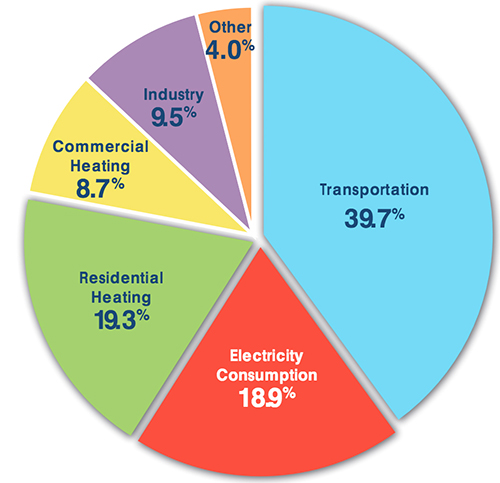
The transportation sector accounts for 39.7% of Rhode Island’s climate emissions. The state’s continued failure to reduce this pollution will have deep impacts on public health and whether the Ocean State can meet its emissions mandates without getting lucky.
Rhode Island has the roadmaps to reduce vehicle miles traveled, but the taxpayer-funded plans are collecting cyber dust. In December 2020, the State Planning Council adopted the Transit Master Plan and the Bicycle Mobility Plan, with each providing a step-by-step outline on how to improve bus and rail services and bicycle infrastructure. Few of the plans’ recommendations have been implemented, or even considered.
As state officials continue to pussyfoot around the transit issue, Rhode Island’s outdated transportation system keeps falling further behind the efforts needed to protect public health and mitigate the climate crisis. A strong, convenient, well-supported public transit system would help address both issues. But few if any lawmakers ride the bus.
Rhode Island has the highest cost of car ownership in New England and a lower median income than our neighboring states, leaving many households overly burdened with transportation costs.
“More than 15 percent of US household income goes toward purchasing, fueling, and maintaining personal vehicles, making it the second-largest household expense behind housing,” according to a 2017 white paper by the Union of Concerned Scientists (UCS). “Every year, Northeast residents send billions of dollars out of the region to purchase fuel, enriching oil companies at the expense of our local economy.”
Meanwhile, Rhode Island hasn’t invested adequately in alternatives that would allow people to get out of their cars and save money, and emissions. Public transit does not run frequently enough or go to enough places to be a workable option for many people, despite 77% of the state’s population living within a 10-minute walk of a transit stop.
Generations of state leaders have failed to effectively support the Rhode Island Public Transit Authority. The Senate president now wants a transportation dinosaur, the state Department of Transportation, to take control of RIPTA.
Sidewalks are often crumbling or nonexistent, obstructed by overgrown vegetation and poorly placed signs, and seldom plowed when it snows. The state’s bicycle network is an incomplete patchwork that requires riding on dangerous roads.
The needs of Rhode Island households that don’t own a car — about 9%, according to a 2022 report of census data — remain neglected.
Disregard for the law and the histrionics of fossil fuel-funded front groups have stymied state efforts to reduce transportation-sector emissions.
To lessen pollution impacts from internal combustion engines, the state decided two decades ago it was going to crack down on diesel emissions spewing from Rhode Island’s largest vehicles.
A 2000 amendment to state law acknowledged that heavy-duty diesel vehicles contribute significantly to air pollution and diminish “the quality of life and health of our citizens.” The amendment also noted the “Citizens of Rhode Island frequently raise concerns about emissions from heavy-duty diesel engines” and “Technology exists to determine the level of exhaust emissions from heavy-duty vehicles.”
“It is in the public interest to establish a program regulating exhaust emissions from heavy-duty diesel trucks and buses traveling within Rhode Island,” the amended law stated. It directed the Division of Motor Vehicles and the Department of Environmental Management to tackle the issue and launch such a program by 2003.
Twenty years later, no program exists.
Forget the Ocean State, Rhode Island license plates should read, “We Ignore the Law so You Don’t Have to.”
In a June 2022 email to ecoRI News, a DEM spokesperson wrote, “DEM’s Office of Air Resources continues to partner with the DMV in developing a heavy-duty inspection and maintenance (HD I&M) program. The goal is to finalize Heavy-duty I&M Regulations by the end of 2022 with a program launch in 2023.”
The process of creating a program requires DEM and the DMV to submit draft regulations at the same time, according to Michael Healey, DEM’s chief public affairs officer. He said DEM’s draft regulations have been done since last fall.
In an April 14 email to ecoRI News, Paul Grimaldi, public affairs staffer for the state Department of Revenue, which oversees the DMV, blamed a flooded building for the delay.
“DMV Safety and Emissions Facility suffered catastrophic flooding in September 2022 that delayed development of the Heavy Duty Inspection and Maintenance Program,” he wrote. “DMV and DEM staff continue to meet and work on finalizing regulations for the program. While we are working diligently on those regulations we cannot yet offer a timeframe for their implementation. In the meantime, the DMV is working on a long-term solution for replacing its flood-damaged inspection facility in Providence.”
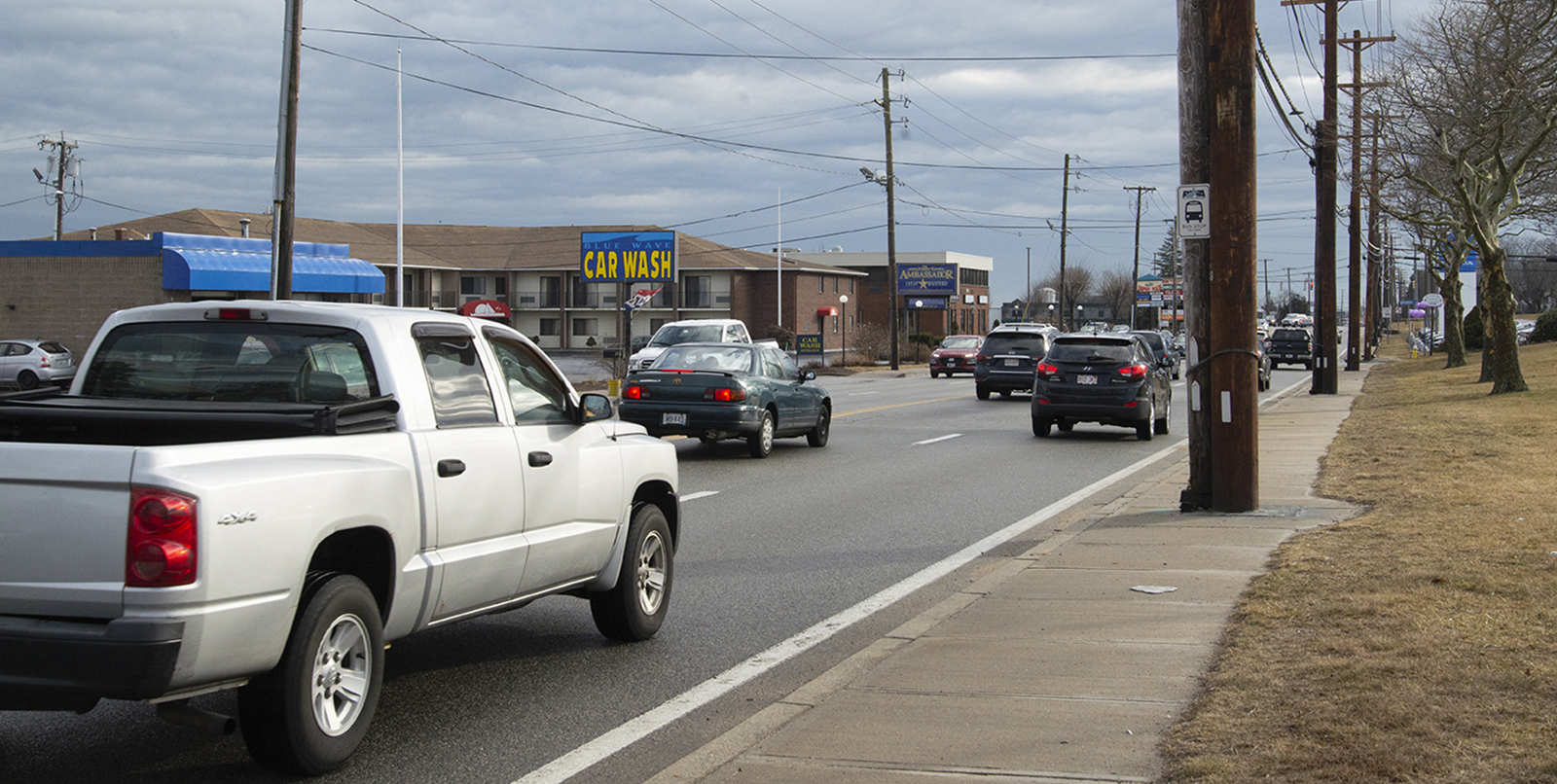
The multistate Transportation & Climate Initiative (TCI), of which Rhode Island was a member, crumbled after just a little pushback from the fossil fuel industry and climate change deniers. The idea behind the 10-years-in-the-making initiative was to address the largest source of greenhouse gas emissions in the Northeast and Mid-Atlantic: the transportation sector. Transportation accounts for about 44% of the total carbon emissions in the regions.
The proposed cap-and-invest plan would have required distributors of gasoline and on-road diesel fuel to buy carbon credits to offset their fossil fuel pollution. Proceeds from the sale of those allowances would have funded incentives and programs for electric vehicles, low-polluting buses and trucks, and bicycle and pedestrian infrastructure.
The TCI selection process would have given consideration to low-wealth neighborhoods, communities of color, people with limited mobility, and those most at risk from the consequences of the climate crisis.
“Our nation’s transportation system is very polluting because it is wasteful and inefficient,” according to the UCS. “Four of the five states with the longest commute times in the country are located in the Northeast: Maryland, Massachusetts, New Jersey, and New York; long commutes are due in part to traffic congestion, a growing problem in every Northeast metro area, as well as higher housing costs that force many people to live farther away from their jobs. At the same time, inadequate access to affordable transportation remains a major barrier to opportunity, particularly for low-income communities, communities of color, rural residents, the disabled, and the elderly.”
The Cambridge, Mass-based nonprofit has said reducing transportation-related emissions will require a coordinated set of policies and regulations. It will require cooperation between local, state, regional, and federal governments, and between government and the private sector.
“And most importantly, it will require policy leaders to identify and prioritize new sources of funding for clean transportation priorities,” according to the UCS.
The TCI embraced some of those solutions. It failed because the paid defenders of the status quo threw a temper tantrum and elected officials failed to lead.
Organizations with ties to the fossil fuel industry hyperventilated and began attacking the regional effort to reduce polluting climate emissions. In an email blast, Mike Stenhouse, CEO of the Rhode Island Center for Freedom & Prosperity, worked in all the key words, calling the program a “regressive fuel tax” and a “green-new-deal type government mandate.” (The word “woke” was left out, because it hadn’t yet been co-opted by those trying to “Make America Great Again.”)
These free-market custodians say trust the capitalist system, but we can’t afford to because there are too many bad actors.
In early April, for example, the owner of a North Kingstown trucking company admitted to a judge that he conspired with companies around the country to violate the Clean Air Act.
Michael J. Collins, his company M&D Transportation, and his now-defunct computer company Diesel Tune-Ups of RI Inc. were accused of tampering with vehicle systems designed to reduce pollution, according to an April 4 story published on Boston.com.
The federal government said the three entities worked in conjunction with various trucking and diesel vehicle sales and repair companies across the country from about September 2014 through Aug. 27, 2019. The goal was to alter or disable the monitoring systems of heavy-duty diesel vehicles so they could run with extra horsepower and torque — significantly increasing the amount of pollutants emitted by these tampered with vehicles.
The solution, as the Union of Concerned Scientists has noted, requires cooperation between government and the private sector, because the climate emergency demands it. Atmospheric levels of carbon dioxide, methane, and nitrous oxide — the greenhouse gases emitted by human activity that are the most significant contributors to the climate crisis — continued to increase rapidly last year, according to the National Oceanic and Atmospheric Administration.
Carbon dioxide levels, for instance, rose by more than two parts per million for the 11th consecutive year — the highest sustained rate of CO2 increases since monitoring began 65 years ago. Before 2013, scientists had never recorded three consecutive years of such high CO2 growth, according to a recent story in The Guardian.
Another year will likely end without a plan in place to reduce the amount of emissions spewed by Rhode Island’s transportation sector. But if one is announced, it can’t simply be replacing all the internal combustion vehicles with electric ones. Also, let’s hope the DMV has learned not to store its only copy of its draft plan in the basement.
Frank Carini can be reached at [email protected]. His opinions don’t reflect those of ecoRI News.

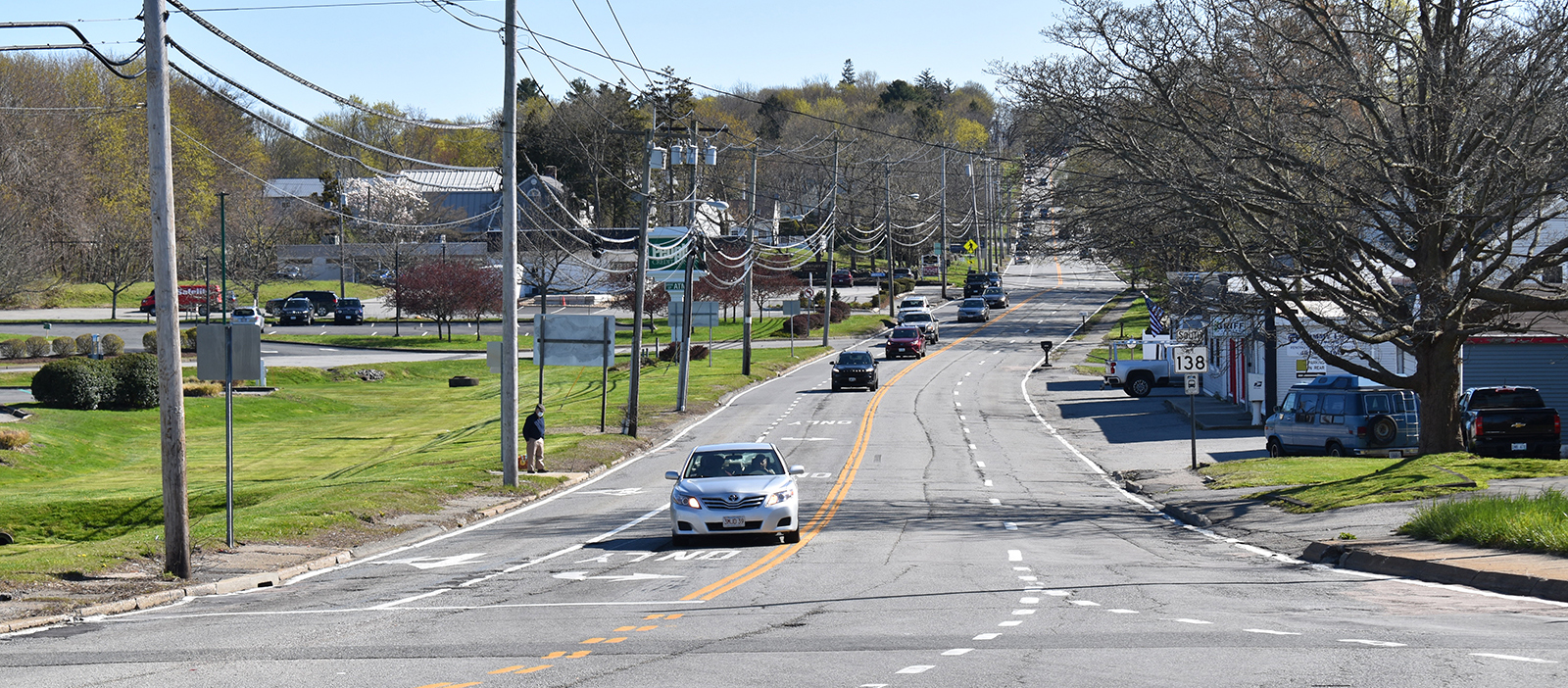
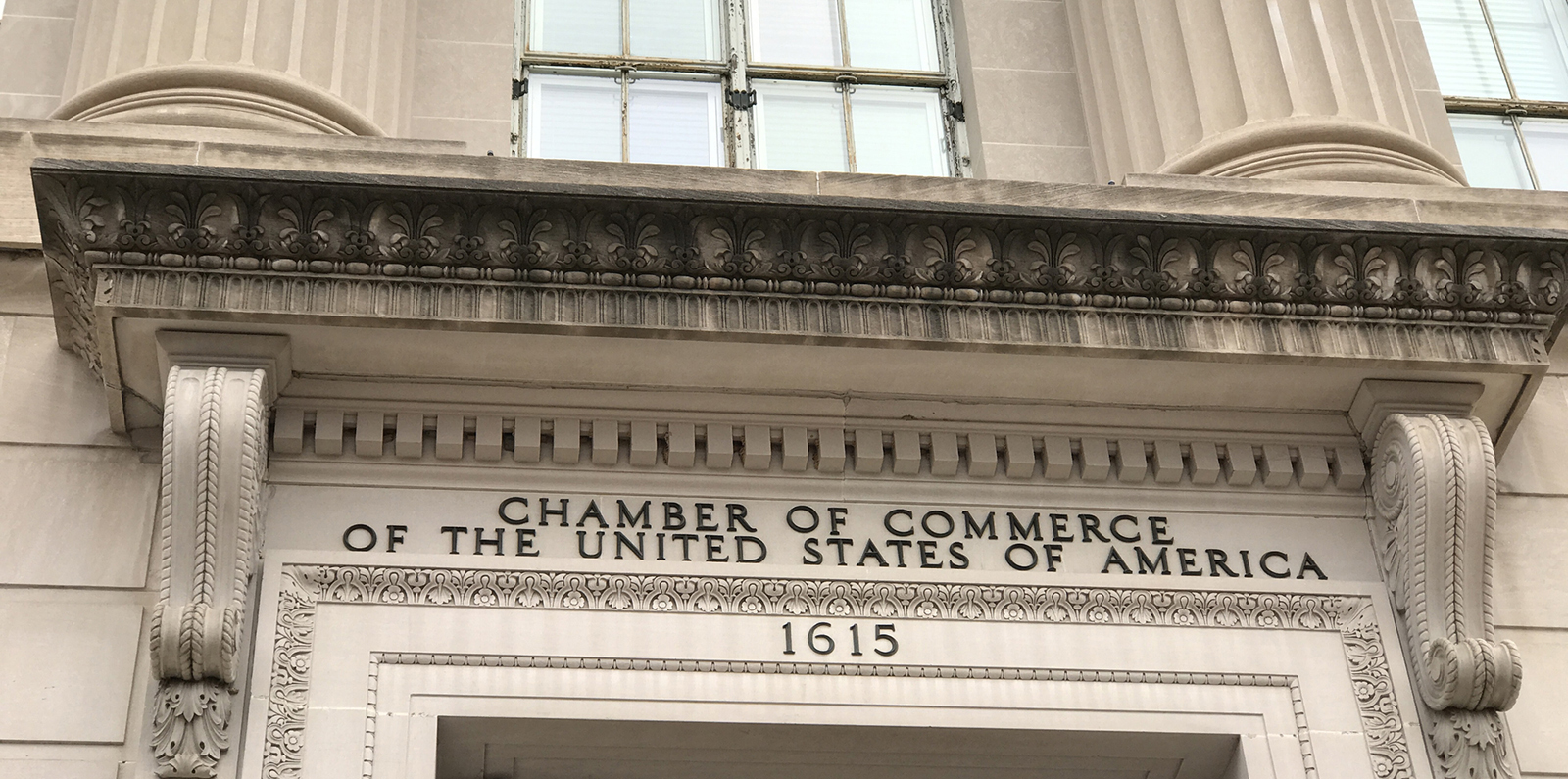
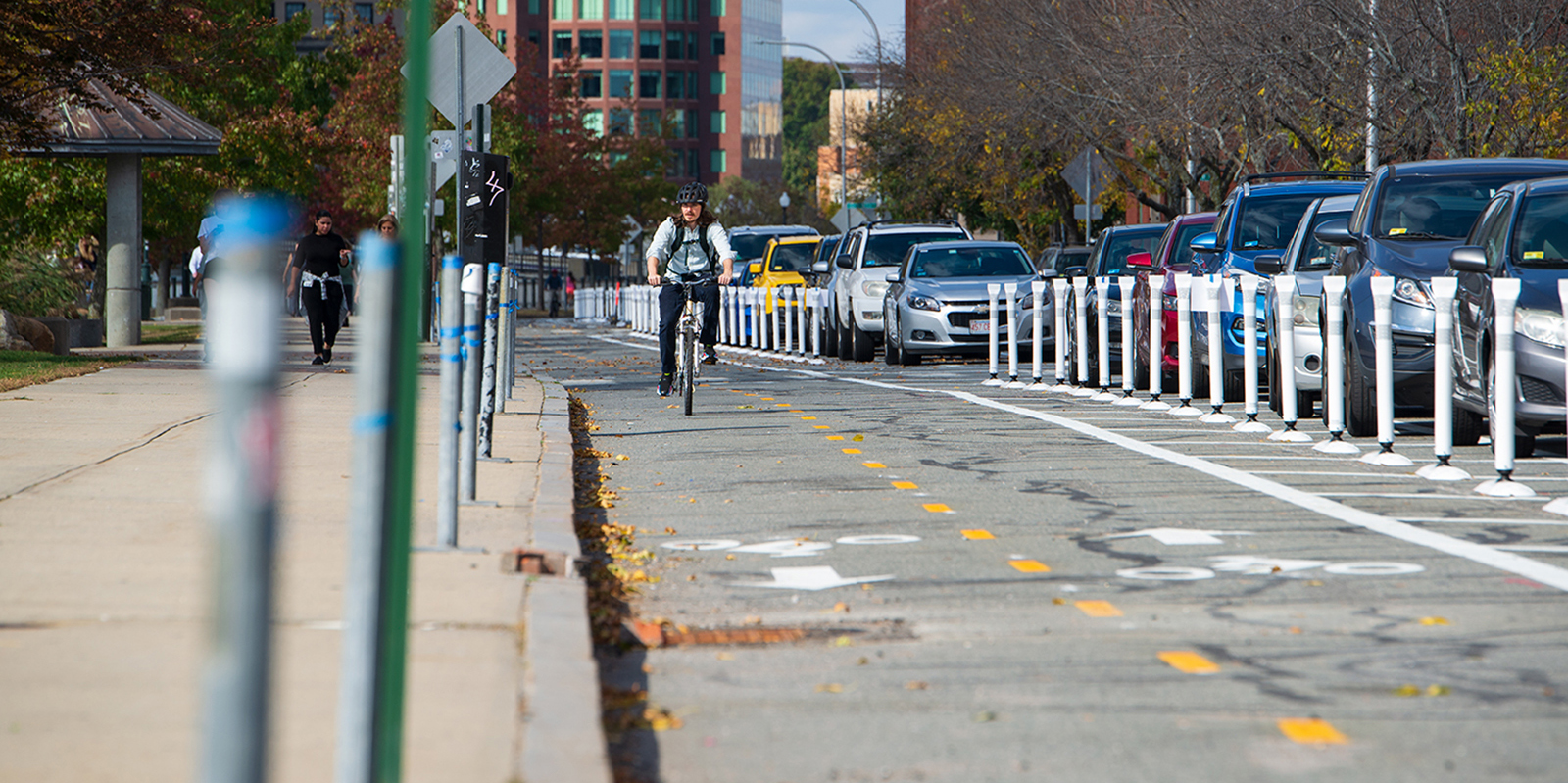
Does Rhode Island ever get around to doing the things it legislates?
It is time to keep calling out the fossil fuel and related industries out because we have been told the market will solve our problems for 40 years, but the market or the companies in it, have NEVER offered us a solution to anything. It is time for the legislature to stop paying attention to the know nothing sticks in the mud pretending to be innovators who have had many years to offer solutions and consistently offer nothing of value and just say no to solving problems by the community.